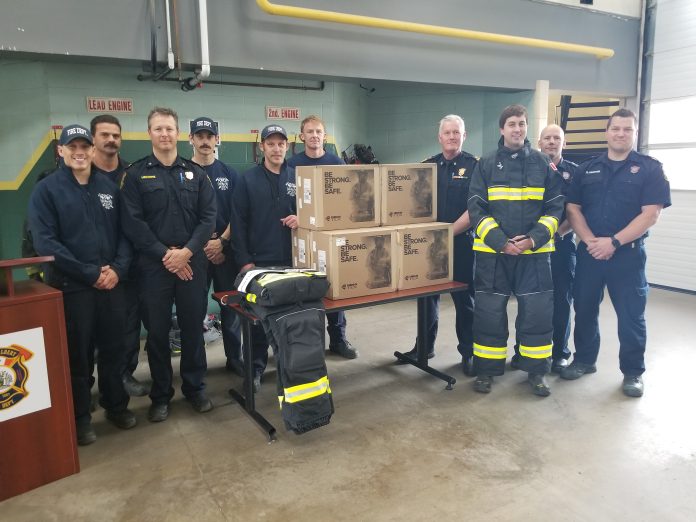
The Prince Albert Fire Department has unveiled some new gear to help reduce that rate of occupational cancer in local firefighters.
Prince Albert is one of the first departments in Canada to use the new gear. Fire Chief Kris Olsen said it’s encouraging to see.
“This is a positive day,” Olsen said during the announcement on Wednesday. “This is a move in the right direction.”
Many occupational cancers that firefighters suffer from are caused by a chemical call per- and polyfluoroalkyl, of PFAS. The International Association of Firefighters (IAFF) has classified PFAS as “forever chemicals” meaning they never leave a firefighters body, leading to serious health issues.
Olsen said the chemical was initially used to help protect firefighters from severe burns caused by steam, but high occupational cancer rates have fire departments questioning their use.
The Prince Albert Fire Department acquired eight new PFAS turnouts on Wednesday. The goal is to have 48 in total, with each one being replaced every six years.
“These turnouts are very expensive and we have to work within our budget,” Olsen said. “That will be a challenge, however we are committed … for a six year replacement of each set of turnout gears. That’s when they age out, and we have held that standard for many, many years.”
The cost of the PFAS-free turnouts isn’t known yet. Olsen said they paid a reduced cost to get the first set, but the price will likely go up significantly in 2025. He said that’s been a common theme for much of the gear firefighters use.
Regardless of the cost increase, Olsen said the new turnouts are worth it.
“The City of Prince Albert does take the health and safety of its firefighters very seriously,” he said.
“Cancer is quickly becoming the number one risk to all firefighters, not only from the fires we routinely deal with, but from the gear that was meant to protect us from those situations,” he added.
Prince Albert firefighter and IAFF Local 510 President Ben Hunter was among the firefighters on hand for Wednesday’s unveiling. Hunter said the new PFAS turnouts are a welcome relief.
“I thought it was fantastic,” he said. “It’s something we’ve been talking about through OHS for a long time, increasing the health and safety of our members. There’s a definite benefit to it.”
Hunter says he received updates every day from the IAFF about firefighters who have died from cancers linked to their occupation. He said it’s hard to say how effective the new turnouts will work, but knowing the cancer-causing elements are gone is “a huge win.”
Hunter said other things like some new building materials and modern products that burn in homes have caused houses to burn faster, making firefighting more dangerous, but cancer is still their biggest concern.
Hunter said roughly 94 per cent of Canadian firefighters who die due to occupational hazards die from cancer.
“Cancer is quickly becoming the number one risk to all firefighters, not only from the fires we routinely deal with, but from the gear that was meant to protect us from those situations,” he said.
The new turnouts are one of several steps the Prince Albert Fire Department has taken to reduce occupational cancers in its members. Among them are updates to the department’s clean station policy in compliance with the Workers Compensation Board.
The City of Vancouver was the first municipal fire department in Canada to acquire the new turnouts. They began using them in April.

